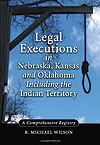 Legal Executions in Nebraska, Kansas and Oklahoma Including the Indian Territory: A Comprehensive Registry, by R. Michael Wilson, McFarland & Co., Jefferson, N.C., 2012, $125
Legal Executions in Nebraska, Kansas and Oklahoma Including the Indian Territory: A Comprehensive Registry, by R. Michael Wilson, McFarland & Co., Jefferson, N.C., 2012, $125
R. Michael Wilson rates as one of the most dedicated researchers in the Western history field. This 367-page fact-filled gem is the latest in his well-executed Legal Executions series. The subtitle, A Comprehensive Registry, is well deserved. This volume, like Wilson’s earlier ones on geographical sections west of the Mississippi, tells many stories—sad by their very nature, but sometimes with a sprinkling of humor (dark or otherwise) and never dull. We’re all going to die, no matter our convictions; these “convicted” individuals just had a little help getting to the other side, thanks to justice officials.
In his preface the author, who almost certainly has researched capital punishment in the American West more than anyone dead or alive, opines that the death penalty is no deterrent to murder and that “if there is a justification for the infliction of death as a punishment, it must be to prevent future murders by the same miscreant.” Whether or not you agree with him, Wilson has done his homework, relying heavily on contemporary newspapers, as well as court records, diaries and personal accounts. These Executions volumes, like his Stagecoach Robberies titles and the rest of his books, are a researcher’s delight. Wilson presents case histories by state—actually back to territorial days. Authorities legally hanged two men in separate executions before Nebraska became a state on March 1, 1867. A firing squad executed one man, John Coon Jr., before Kansas became a state on January 29, 1861. Coon, a 15-year-old Wyandotte Indian, had struck one Curtis Punch with a fireplace poker during a drunken brawl. Much more was happening in the execution department during Oklahoma’s territorial days. For instance, 31 men were hanged and 36 executed by firing squad in Indian Territory between 1840 and 1899. Many other convicted criminals from Indian Territory found a federal rope waiting for them at nearby Fort Smith, Ark., from October 8, 1873, to January 25, 1889. Oklahoma, by the way, is one of the big five states (along with Florida, Missouri, Texas and Virginia) with regard to number of executions today. Nebraska and Kansas have also retained the death penalty, though neither has many inmates on death row.
—Editor




